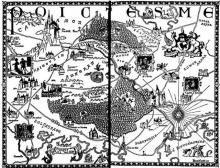- Home
Page 3
Page 3
 Jurgen: A Comedy of Justice
Jurgen: A Comedy of Justice Chivalry
Chivalry Figures of Earth: A Comedy of Appearances
Figures of Earth: A Comedy of Appearances_preview.jpg) The Certain Hour (Dizain des Poëtes)
The Certain Hour (Dizain des Poëtes) Domnei: A Comedy of Woman-Worship
Domnei: A Comedy of Woman-Worship The Line of Love; Dizain des Mariages
The Line of Love; Dizain des Mariages The Line of Love. Dizain des Mariages
The Line of Love. Dizain des Mariages The Certain Hour. Dizain des Poëtes
The Certain Hour. Dizain des Poëtes The Jewel Merchants. A Comedy in One Act
The Jewel Merchants. A Comedy in One Act Gallantry. Dizain des Fetes Galantes
Gallantry. Dizain des Fetes Galantes The Cords of Vanity. A Comedy of Shirking
The Cords of Vanity. A Comedy of Shirking Domnei. A Comedy of Woman-Worship
Domnei. A Comedy of Woman-Worship Figures of Earth
Figures of Earth Jurgen. A Comedy of Justice
Jurgen. A Comedy of Justice Taboo. A Legend Retold from the Dirghic of Sævius Nicanor, with Prolegomena, Notes, and a Preliminary Memoir
Taboo. A Legend Retold from the Dirghic of Sævius Nicanor, with Prolegomena, Notes, and a Preliminary Memoir